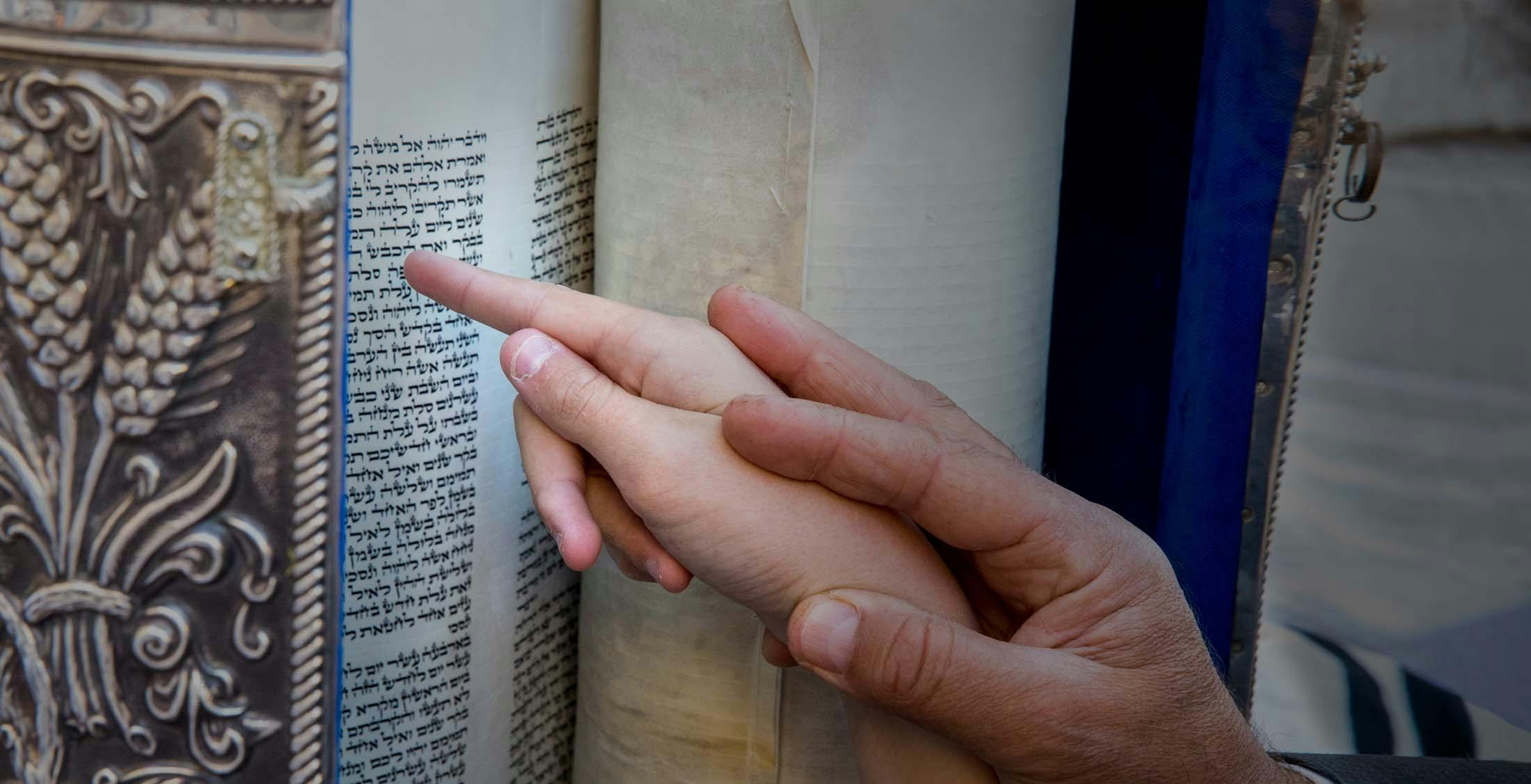
Is Jesus a Rabbi?
Jesus is often misunderstood because he's taken out of context.
by Stephanie Hamman | July 23 2018
In 1960, Norman Cousins, former editor of the Saturday Review wrote, “There is every reason for Judaism to lose its reluctance toward Jesus. His own towering spiritual presence is a projection of Judaism, not a repudiation of it.”1 But decades later, Jesus still remains an enigma to many Jewish people – was he a rabbi, a rebel, a false prophet?
First-century Judaism
To help answer this question, we need to understand Yeshua (Jesus) in the context of first-century Judaism. If you think modern Judaism is complicated, during the Second Temple period Judaism took on a variety of forms, many of which are not comparable to today’s expressions, culturally or otherwise. Several of the first-century Jewish sects are spoken of in the New Testament, as well as in other historical sources. There were the Essenes, Zealots, Sadducees and Pharisees. According to the New Testament, the sect with which Jesus interacted the most was the Pharisees.
The Pharisees
The Pharisees were the guardians of the oral law and traditions of Israel. Although generally depicted as extremists who insisted on dotting all the i’s and crossing all the t’s of Judaism, many were the moderates of their day, attempting to create a middle path that all of Israel could follow. Author Alan F. Segal refers to the Pharisees as “loose constructionists of the Torah,” contrasting them with the Sadducees, who he terms “strict constructionists.”2
Jesus had many conversations with the Pharisees (e.g., Matthew 19:3–9, Mark 12:28–34, Luke 19:39), answering their questions, often pointedly, to challenge their thinking. But he was included as a relevant voice worthy of their engagement. The Pharisees themselves acknowledge him as a peer, calling him “Rabbi” (Luke 19:39). The Talmud is full of conversations between rabbis much like those Yeshua is recorded as having had with them in the New Testament.
In the first century, only teachers among the Pharisaical sect were called rabbi (though rabbinical ordination as we know it did not begin until later). Until that time, there had been no such special distinction in Judaism.3 Jesus’ status among the Pharisees is most poignant in John 3:2, where a leading Pharisee (Nicodemus) calls him Rabbi.
Here is part of that fascinating conversation:
Now there was a man of the Pharisees named Nicodemus, a ruler of the Jews. This man came to Jesus by night and said to him, “Rabbi, we know that you are a teacher come from God, for no one can do these signs that you do unless God is with him.” Jesus answered him, “Truly, truly, I say to you, unless one is born again he cannot see the kingdom of God.” Nicodemus said to him, “How can a man be born when he is old? Can he enter a second time into his mother’s womb and be born?” (John 3:1–4)
After a bit more back and forth, Jesus makes this rather audacious statement:
Nicodemus said to him, “How can these things be?” Jesus answered him, “Are you the teacher of Israel and yet you do not understand these things?” (John 3:9–10)
Jesus as a rabbi
So, Jesus was considered a rabbi in his day by the only sect that used the term. But exactly what kind of rabbi was he? Where did he agree and differ with the theology of other rabbis?
Free will
The tension between the sovereignty of God and human freedom is still highly debated today. On this point, the Pharisees were middle-of-the-road. Rabbi Akiva, one of the most important religious leaders of the second century A.D., said, “All is foreseen but freedom of choice is given”4 (Avot 3:16). Israel’s Outside Literature, known today as the Apocrypha and Pseudepigrapha, also took this position: “For man . . . cannot add to, so as to enlarge, what has been prescribed by Thee” (Psalms of Solomon 5:6).5
Yeshua agreed, as shown by his statement:
“But behold, the hand of him who betrays me is with me on the table. For the Son of Man goes as it has been determined, but woe to that man by whom he is betrayed!” (Luke 22:21–22)
The phrase, “as it has been determined,” regarding the death of Yeshua, indicates that God had decreed it from the beginning. At the same time, we see woe to the person (Judas Iscariot) who betrays the Messiah. The Pharisees did not try to solve the problem of the seemingly mutually exclusive free will of man versus God’s pre-ordained decrees. Instead, they put them side by side as factors to be considered in many of life’s situations. Jesus did the same.
Yeshua and the Pharisees also agreed about resurrection.
Resurrection
Yeshua and the Pharisees also agreed about resurrection. The Sadducees accused the Pharisees of inventing this doctrine, claiming it could not be proven from Torah. The Pharisees said it could be. Rabbi Jacob stated: “This world is like a vestibule before the world to come: prepare thyself in the vestibule that thou mayest enter into the banquet hall” (Avot 4:16).6
Yeshua also engaged with the Sadducees regarding the resurrection. They tried to ensnare him with a hypothetical question about a woman who is widowed and marries the brother of her late husband. When they asked Jesus who her husband would be in the world to come, he replied:
“For when they rise from the dead, they neither marry nor are given in marriage, but are like angels in heaven. And as for the dead being raised, have you not read in the book of Moses, in the passage about the bush, how God spoke to him, saying, ‘I am the God of Abraham, and the God of Isaac, and the God of Jacob’? He is not God of the dead, but of the living. You are quite wrong.” (Mark 12:25–27)
Core of the Torah
Regarding the essential teachings of the Torah, the Pharisees and Jesus were on the same page. The Talmud records Hillel, the foremost teacher in Judaism in the first century B.C., as saying, “That which is hateful to you do not do to another; that is the entire Torah, and the rest is its interpretation” (Shabbat 31a). Or, in Yeshua’s words, “So whatever you wish that others would do to you, do also to them, for this is the Law and the Prophets” (Matthew 7:12).
The New Testament contains a remarkable conversation between a scribe (scribes were of the sect of the Pharisees) that happened immediately after Jesus and the Sadducees had been debating the doctrine of resurrection:
And one of the scribes came up and heard them disputing with one another, and seeing that he answered them well, asked him, “Which commandment is the most important of all?” Jesus answered, “The most important is, ‘Hear, O Israel: The Lord our God, the Lord is one. And you shall love the Lord your God with all your heart and with all your soul and with all your mind and with all your strength.’ The second is this: ‘You shall love your neighbor as yourself.’ There is no other commandment greater than these.” And the scribe said to him, “You are right, Teacher. You have truly said that he is one, and there is no other besides him. And to love him with all the heart and with all the understanding and with all the strength, and to love one’s neighbor as oneself, is much more than all whole burnt offerings and sacrifices.” And when Jesus saw that he answered wisely, he said to him, “You are not far from the kingdom of God.” (Mark 12:28–34)
Jesus saw eye-to-eye with the scribe about the greatest commandments.
Material wealth
Neither the Pharisees nor Jesus were interested in amassing material goods. Hillel, who presided over the Sanhedrin from 30 B.C. to A.D. 10., once said: “The more flesh the more worms; the more possessions the more care” (Avot 2:7).7
True spirituality is found in serving others.
The Pharisees taught unselfishness: “What is mine is thine, and what is thine is thine own” (Avot 5:10).8 So did Yeshua: “No one can serve two masters, for either he will hate the one and love the other, or he will be devoted to the one and despise the other. You cannot serve God and money” (Matthew 6:24). He said that true spirituality is found in serving others. He taught his disciples to live simply and care for the poor.
The balanced life
The Pharisees could enjoy both eating and dancing, and yet gave themselves to fasting and somberness when appropriate. Hillel summed up this balance between regard for self and the regard for others: “If I am not for myself, who is for me? And being for mine own self what am I?” (Avot 1:14).
Yeshua exemplified balance. He enjoyed eating and drinking with Pharisees (Luke 7:37–50), but he also taught sacrifice: “And calling the crowd to him with his disciples, he said to them, ‘If anyone would come after me, let him deny himself and take up his cross and follow me. For whoever would save his life will lose it, but whoever loses his life for my sake and the gospel’s will save it’” (Mark 8:34–35).
Women
Hillel, known for his moderation on many issues, once said: “The more women the more witchcrafts” (Avot 2:7).9 Ben Sirach declared: “From a woman sin had its beginning, and because of her we all die. Allow no outlet to water, and no boldness of speech in an evil wife. If she does not go as you direct, separate her from yourself.”10
Yeshua held a far different position. The Gospel of Luke, in particular, shows his high regard for women in that he spent significant time in their company. Jesus emphasized that women had worth. He even came to the defense of a woman caught in the act of adultery, telling her accusers to cast their stones only if they themselves were without sin (John 8:7). Women were also among Jesus’ disciples (Mark 15:40–41; Luke 8:1–3; 10:42; John 4:7–27).
The common people
The am ha-ares (literally, “the people of the land” or common people) and the Pharisees were at odds. One rule of the Pharisees was: “A Pharisee may not eat with an am ha-ares.” (Berakot 43b).11
Yeshua challenged this attitude. Levi (Matthew) became a follower of Yeshua and gave a banquet. He invited his former “coworkers” – tax collectors who were considered the dregs of society. Yeshua attended because these were the people who needed him the most. His compassion gave rise to this accusatory question by some of the religious leaders: “Why do you eat and drink with tax collectors and sinners?” (Luke 5:30).
The main bone of contention
Then Jesus said to the crowds and to his disciples, “The scribes and the Pharisees sit on Moses’ seat, so do and observe whatever they tell you, but not the works they do. For they preach, but do not practice. They tie up heavy burdens, hard to bear, and lay them on people’s shoulders, but they themselves are not willing to move them with their finger. They do all their deeds to be seen by others.” (Matthew 23:1–5).
Not all Pharisaical teaching was burdensome, and within his own lifestyle, Yeshua participated in some extra-biblical traditions. But in declaring that the Pharisees “do all their deeds to be seen by others,” Jesus was saying that rather than observing the Torah and traditions to serve God, they were doing so to serve themselves and their egos.
Jesus criticized the Pharisees for not being true shepherds of the people. Yeshua instructed the people to do as the Pharisees taught, but not to live as they lived and pointed out how some placed burdens on others that they were not able to carry themselves. In their preoccupation with man-made traditions, Yeshua said, they were missing the heart of the Torah. The irony is that to this day, the tradition is meant to protect the Torah—or the Jewish person from the possibility of breaking the Torah.
What happened to the Pharisees?
When Jerusalem was destroyed in A.D. 70, some leading Pharisees approached their conquerors and asked to be allowed to live in the north of Israel. There they codified the oral traditions, and, eventually, the Rabbinic age was born. The descendants of the Pharisees are the Orthodox and Conservative Jews of today (Reform Judaism arose as an alternative to traditional Judaism).
Yeshua’s disciples called him Rabbi
Some of the disciples of John the Baptist, the Jewish prophet who said he had come that “he [the Messiah] might be revealed to Israel,” (John 1:31), became disciples of Jesus:
The next day again John was standing with two of his disciples, and he looked at Jesus as he walked by and said, “Behold, the Lamb of God!” The two disciples heard him say this, and they followed Jesus. Jesus turned and saw them following and said to them, “What are you seeking?” And they said to him, “Rabbi” (which means Teacher), “where are you staying?” He said to them, “Come and you will see.” So they came and saw where he was staying, and they stayed with him that day, for it was about the tenth hour. (John 1:35–39)
The New Testament records several other instances in which Jesus’ disciples called him rabbi, as in this passage: “Meanwhile the disciples were urging him, saying, “Rabbi, eat” (John 4:31).
The common people called him Rabbi
When Jesus was leaving Jericho one day, a blind beggar named Bartimaeus cried out to him. They had this conversation:
And Jesus said to him, “What do you want me to do for you?” And the blind man said to him, “Rabbi, let me recover my sight.” (Mark 10:51)
On another occasion, a great number of people crossed the Sea of Galilee and went to Capernaum, looking for Jesus. The New Testament tells us: “When they found him on the other side of the sea, they said to him, ‘Rabbi, when did you come here?’” (John 6:25).
More than a rabbi
Yes, Jesus – Yeshua – was a rabbi, a teacher of Judaism in the first century A.D.
But was he more than a rabbi?
We must obey God rather than men.
Following Jesus’ death, Peter and several of Jesus’ other followers were brought before the Sanhedrin (or council, the religious supreme court of Israel) because they had disobeyed an order to not tell other Jewish people about Jesus. When Peter replied, “We must obey God rather than men” (Acts 5:29), the council was ready to sentence them to death. However, the Pharisee Gamaliel intervened. Here’s what he said:
Men of Israel, take care what you are about to do with these men. For before these days Theudas rose up, claiming to be somebody, and a number of men, about four hundred, joined him. He was killed, and all who followed him were dispersed and came to nothing. After him Judas the Galilean rose up in the days of the census and drew away some of the people after him. He too perished, and all who followed him were scattered. So in the present case I tell you, keep away from these men and let them alone, for if this plan or this undertaking is of man, it will fail; but if it is of God, you will not be able to overthrow them. You might even be found opposing God! (Acts 5:35–39)
The Sanhedrin took Gamaliel’s advice and let them go.
Now, almost 2,000 years later, not only have the teachings of Jesus spread to all nations, but there has always been a remnant of Jewish people who have believed in him. In our day, more and more Jewish people are open to considering Jesus as not only a historical figure, but as a rabbi of note.
If Jesus came to earth today, where could he be found? Probably in dialogue with the Orthodox, the Conservative, the Reform, the secular, the boomers and the millennials on the streets, online and in the synagogues. He would teach, he would listen, and he would ask the same question he asked his disciples: “Who do you say that I am?”
Endnotes
1. “The Jewishness of Jesus,” American Judaism 10:1 (1960), 36.
2. Alan F. Segal, “Society in the Time of Jesus.” Rebecca’s Children: Judaism and Christianity in the Roman World, Belknap Harvard, 53.
3. http://www.jewishvirtuallibrary.org/rabbi
4. The Mishnah, H. Danby, ed., (London: Oxford, 1933), 452.
5. The Pseudepigrapha, Vol 2., R H. Charles, ed. (London: Oxford, 1913), 637, 639.
6. The Mishnah, 454.
7. Ibid., 448.
8. Ibid., 457.
9. Ibid., 448.
10. Ecclesiasticus 25:24–26.
11. Zeraim, Babylonian Talmud. (London: Soncino, 1948), 266, 267.

